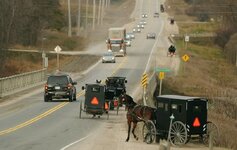Mr. Coffee
Well-Known Member
- Region
- USA
- City
- A Demented Corner of the North Cascades
Agreed that the grenade launcher comment was juvenile and stupid. But the fact that we have to put on a war face to ride on a highway or in city traffic is also stupid, though not juvenile.Calm down. I don't see anyone "victim blaming", just making a general observation about rider visibility and rider safety. Not that it would have made any difference in this sad case. Accidents happen, would you support license revocation for anyone involved in a multi vehicle accident unless the other party was proven to be grossly negligent? How about bicyclists who hit pedestrians or otherwise cause an accident based on their gross negligence, what would you take away from them? Your comment about the grenade launcher is juvenile and stupid.
Also, I believe that motor vehicle operators are obligated to exercise a higher standard of care around cyclists and pedestrians because they are more vulnerable. If that accident on 395-A had been between two cars chances are everyone would have walked away with from it without serious injury. But because one of them was a cyclist they died. And cyclists who hit pedestrians, on the average, do far less harm because both mass and velocity are much smaller.
In the United States around six hundred cyclists and six thousand pedestrians die per year when having an unwanted interaction with motor vehicles. Pedestrians killed by cyclists are probably in the single digits. So I'd argue that it is logical to address the larger problem.
Why do we think it okay that people have to risk their lives to use a public road on a bicycle or when walking?
Also, what would you do about the terrorist in the F150 in Show Low? Should he ever be allowed to operate a motor vehicle again? And why?



